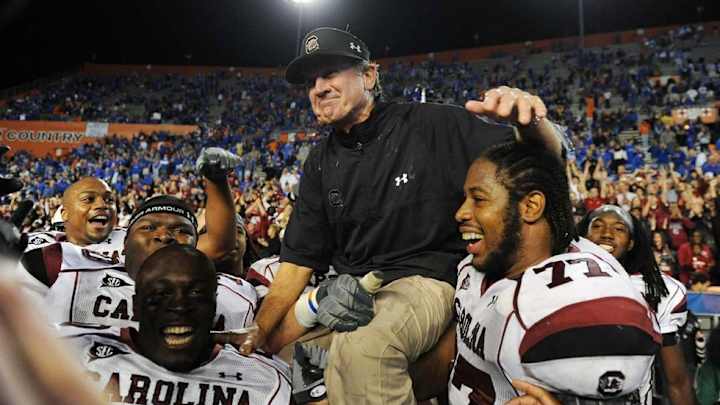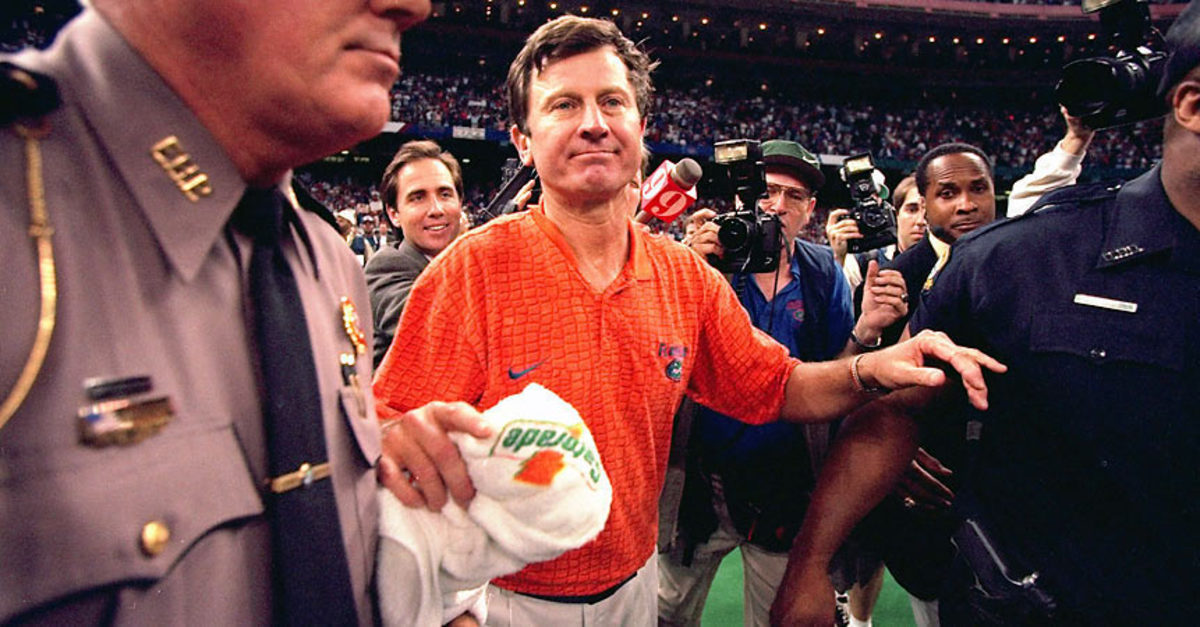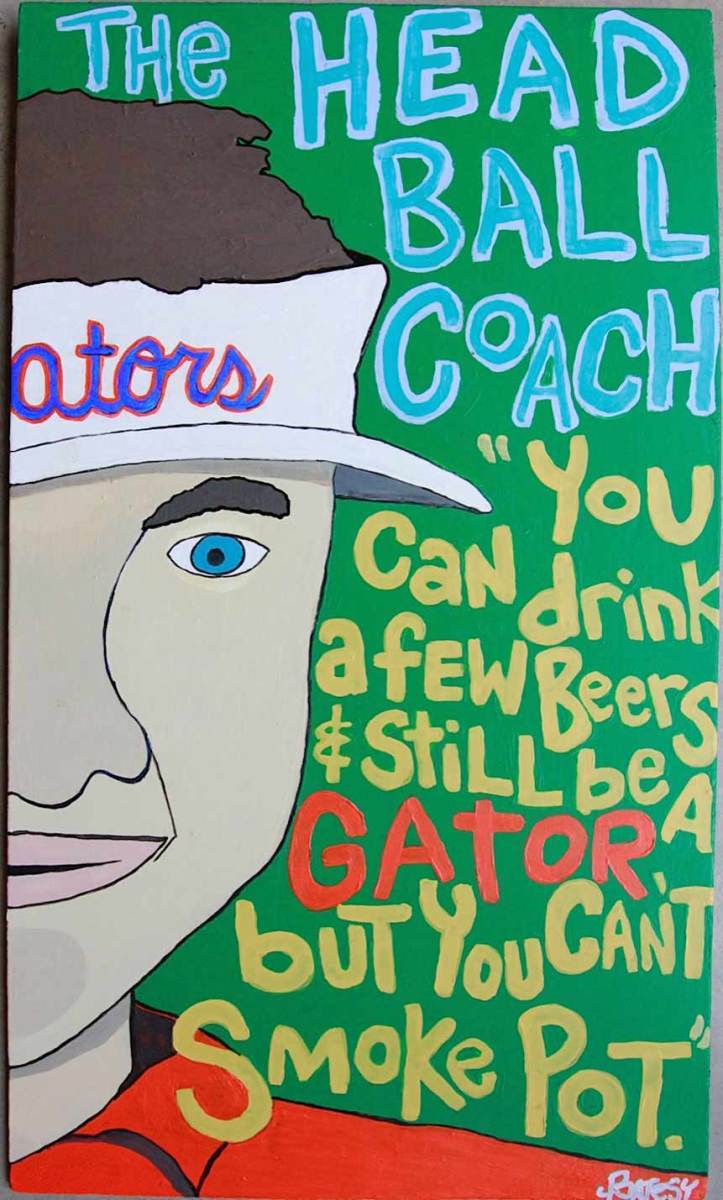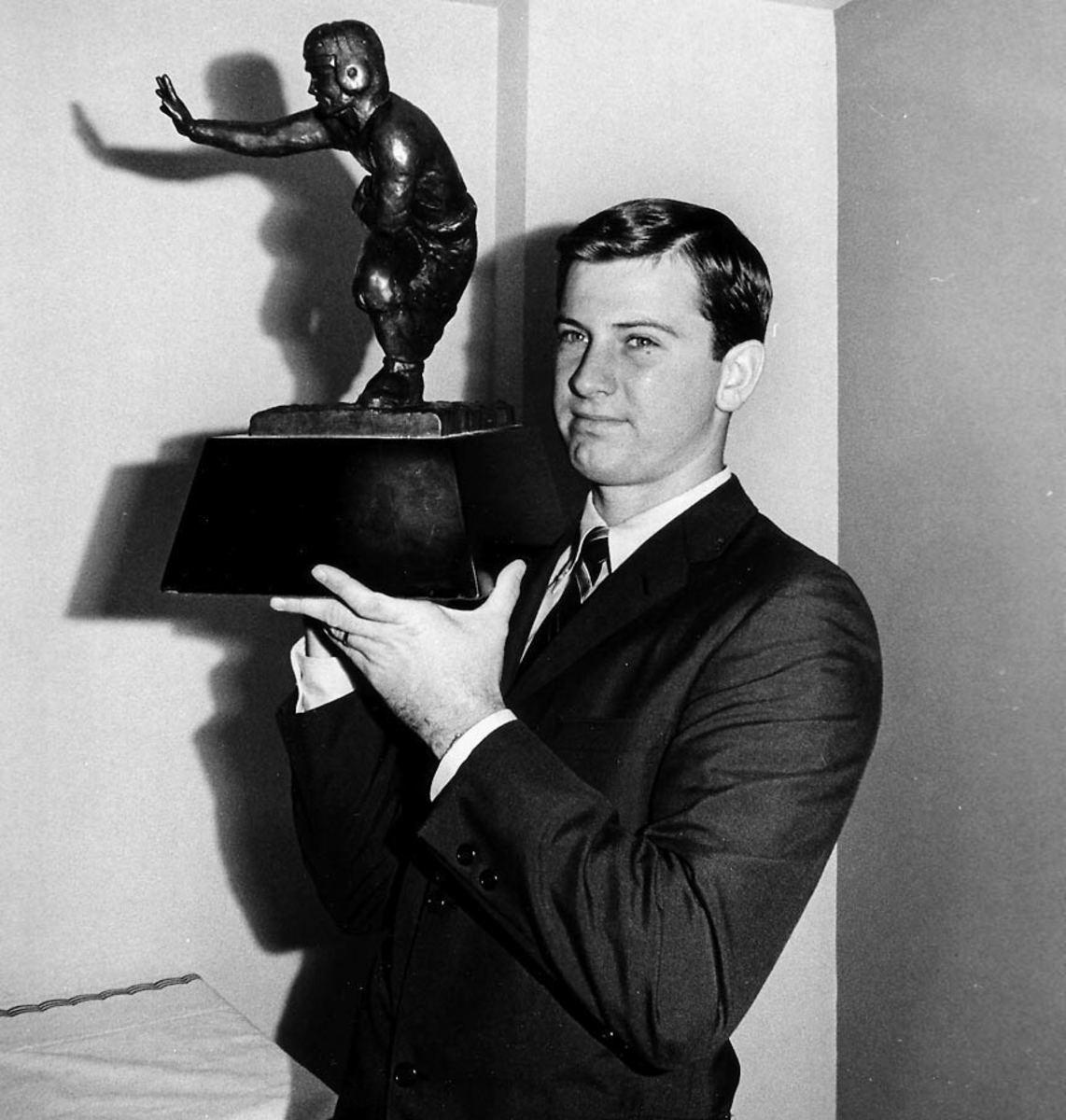Head Ball Coach, out: The legendary and transformative career of Steve Spurrier

The longer practice went, the more frequently I'd glance over at the offensive practice field. Every so often, when some starting defensive lineman like Reggie McGrew or Ed Chester was beating me senseless—they were nice guys; this was just their job—I'd catch a peripheral glimpse of a ball flying down that other field toward the end zone.
I'd repeat the same two words silently to myself. Catch it. Catch it. Catch it.
He'd be standing there in his visor, watching that ball fly. If the bomb landed in the hands of its intended target, the whole offense would erupt. And if that play was perfect enough, maybe he'd put that whistle to his lips and blow a few short bursts.
Then everyone would cheer. Everyone except Bob Stoops.
In 1996, the season he won his only national title, Steve Spurrier liked to end practice on a good one. I was a freshman bucket of walk-on chum at Florida that year, and those brief tweets of the whistle—Spurrierese for "Everybody come here"—sounded like angels singing to everyone except, of course, Stoops. He would be in the middle of yelling Mayday (run that play again), and the whistle would blow. Stoops would go on to become one of the all-time great head coaches at Oklahoma, but in those moments, the then-defensive coordinator was powerless. The Head Ball Coach was done, and practice was over.
The Head Ball Coach blew a few short bursts of the whistle on himself Monday. As the weeks passed this season, it felt more like his final year coaching South Carolina. The shocking part was how quickly and finally it ended. Spurrier will not run out the string. He's just done.

Al Tielemans/SI
This was not the storybook ending befitting a career that changed college football. That would have involved Spurrier, outmanned and outgunned, swapping quarterbacks every play and pulling an upset for the ages. That seemed the only appropriate end for the career of the man who, as a Florida quarterback, inspired the AtlantaJournal's John Logue to write this after the Gators beat Auburn 30–27 in 1966: "Blindfolded, with his back to the wall, with his hands tied behind him, Steve Spurrier would still be a two-point favorite at his own execution." Spurrier would rally them one more time. He would alternate signal-callers the way he did with Doug Johnson and Noah Brindise when his Gators stunned Florida State in 1997, and he would help the Gamecocks win. Maybe Spurrier would finally get that shoulder ride that former Gator James Bates forgot to give him after the 52–20 win over Florida State that gave Spurrier his national title.
Instead, it ended with a team meeting in Columbia following a home game played in Baton Rouge. Burned out, feeling he was hurting more than helping, Spurrier hung it up. He always said he wouldn't go as long as longtime foil Bobby Bowden did. But after Spurrier went 11–2 at age 68, it seemed as if he might. Then the Gamecocks began to slip, and Spurrier began getting constant questions about when he'd retire. Monday, he provided the answer. Right now.
[video:http://bcove.me/84erlnm3]
"I'm sad for college football," said Billy Young, a quarterback from Haines City, Fla., who walked on at Florida in 1995 and became the guy Spurrier trusted to signal plays and remind the coach which personnel package was on the field as Spurrier scanned his play sheet with the play-clock ticking. Young, now a youth pastor living in the Tampa suburbs, hopes the younger generation will appreciate just how groundbreaking Spurrier's offense was. Spurrier won an ACC title at Duke in 1989. (Let's pause for a moment and let that marinate.) He then returned to his alma mater, bringing with him an offense loaded with formations and calls named after ACC schools. He would label his scheme the Fun 'N' Gun, and he would nickname Florida Field "The Swamp." He would also change the future of the SEC.
Spurrier's Florida team finished first in the SEC in 1990, but because of probation dating back to the Galen Hall era, couldn't be named the champion. Florida won the title in '91 and again from '93 to '96. Spurrier won his sixth and final SEC title in 2000, though he still counts 1990 as No. 7. He coached at Florida from 1990-2001, and Spurrier won more SEC titles than he lost home games (five). Because of his scoreboard-rattling offense and his tendency to "hang half a hundred" on opponents, Spurrier caused the SEC to transform.
When he arrived back in Gainesville, the league had a ground-and-pound style with passionate fans but little in the way of coaching innovation. Spurrier forced change by dominating the conference for a decade. Only Tennessee coach Phillip Fulmer would come close, but Fulmer's success seemed to come against everyone else. Spurrier won eight of nine head-to-head meetings between them from 1993 to 2000. By the end of that stretch, things had begun to shift. LSU hired Nick Saban prior to the 2000 season because Saban might be able to find a way to beat Spurrier. Saban did not unlock the secret at first—Spurrier's Gators clobbered Saban's Tigers in 2000 and '01—and then Spurrier decamped for the NFL.

Courtesy of James Bates
During his time at Florida, Spurrier took the penchant for zingers he'd shown at Duke from 1987-89 to the next level. He constantly needled opponents, and no line proved to be more devastating than "You can't spell Citrus without U-T," which memorialized Tennessee's position as the No. 2 team in the SEC during Spurrier's best years. Behind closed doors, Spurrier spoke his mind, too. When Daryl Bush, a hotshot recruit from the Orlando area, came to Gainesville for his official visit, Bush's name was slapped on a No. 44 jersey because that was the number he wore in high school. The only problem was that number belonged to Bates, a redshirt at the time who would grow into a captain on the Gators national championship team. In front of Bush and his mother, Spurrier asked Bates if he planned to surrender the number to help land Bush. Bates replied that he would not. "Well," Bates* recalled Spurrier saying to Bush's mom, "guess he won't be wearing 44 if he's a Gator." Bush went on to become a fine college linebacker—at Florida State.
*When Bates or anyone else tells Spurrier stories, the quotes attributed to Spurrier are always delivered in Spurrier's Tennessee-bred nasal drawl. Bates, now an analyst who calls ACC games, does a Spurrier impression that must be seen and heard.
Young was there the day Spurrier hatched the two quarterbacks plan for the 1997 Florida State game. After meeting with former walk-on Brindise and rocket-armed sophomore Johnson, Spurrier told the rest of the quarterbacks and the receivers. "It was coach Spurrier in the '90s," Young said. "You just knew it would work." When Brindise defied stereotype by whipping deep passes in the second quarter to cut into Florida State's lead, the Seminoles didn't quite know what to think. Then, late in the game, Johnson hit Jacquez Green for a 63-yard gain to set up the Fred Taylor touchdown run that sealed Florida's 32–29 victory. It might have been the quintessential Spurrier game. The Seminoles had national title shot on the line, and the Gators, then 8–2, were going to miss the SEC Championship Game for the first time since its creation in 1992. So, Spurrier spoiled the moment for his rival and gave his team something to remember from a season that otherwise would have been considered a failure when held up against the previous four.
Do you agree with Steve Spurrier's decision to step down in the middle of the season?
Enter this poll by Sports Illustrated
Young, who also served as Florida's holder, spent five years in Florida's quarterback—and receiver, since Spurrier wanted to control both sides of the pitch-and-catch equation—meeting room. Young didn't originally plan to use his final year of NCAA eligibility, but Spurrier put him on scholarship so Young would return in 1999. "He paid for my master's degree," Young said. Young remembers a coach who wanted everything to be perfect. In the pursuit of perfection, Spurrier usually knew which button to push. Young recalled a blowout win against South Carolina in '96 in which quarterback Danny Wuerffel, on his way to winning Florida's first Heisman Trophy since Spurrier took home the award in 1966, was having an uncharacteristically inaccurate game. Spurrier lit into Wuerffel, who got so mad that he went back on the field and threw Steamers—the four-vertical audible that helped define the Fun 'N' Gun—for a touchdown.

Collegiate Images/Getty Images
When Spurrier returned to the SEC at South Carolina after two miserable years with the Washington Redskins, he found a changed conference. Saban had just left LSU for the Miami Dolphins, but he had turned the Tigers into the NFL prep factory we know today. Tommy Tuberville had built an empire at Auburn based on a ferocious defense and a bruising running game. Urban Meyer had just arrived at Florida and inherited a host of future NFL defenders from Ron Zook. The league had evolved. Defenses had adjusted. They knew how to stop the Fun 'N' Gun. Meanwhile, Spurrier had taken over a program that had taken more than 100 years to win its first bowl game. Lou Holtz had enjoyed some success with the Gamecocks, but he had left Spurrier with a mess.
After several frustrating years, Spurrier did what some thought his ego would never allow. He scrapped his beloved Fun 'N' Gun—rebranded the Cock 'N' Fire—and turned the Gamecocks into a team that would run the ball, play sound defense and bleed the clock. The end came on Sept. 11, 2010, when Spurrier got tired of watching quarterback Stephen Garcia get sacked by Georgia. (There is little in this world Spurrier hates more than seeing Georgia succeed against his team.) Later, Spurrier recalled his thought as the game wore on. "I'm not throwing another pass," he said, "unless we have to." South Carolina ended the game with an 11-play, 57-yard field goal drive that ate 7:07 off the clock. A field goal sealed the Gamecocks' 17–6 win. South Carolina won the SEC East that year, and the Fun 'N' Gun gave way to something more similar to the scheme offensive line coach Shawn Elliott had brought from Appalachian State. In '11, after booting Garcia, Spurrier handed over the offense to quarterback Connor Shaw and the transformation to a read-option team was complete. "It's just what we had to do," Spurrier said in '12. "Play-calling is pretty easy. You call what you think is going to work."
It worked for three seasons. South Carolina went 33–6 from 2011 to '13. The Gamecocks beat Clemson in every meeting from '09 to '13. They went to Arby's after SEC Media Days and took iconic pictures. No one had ever experienced this kind of success at South Carolina, and it took a while before it began to feel routine. But it did, because it always does, and a lot of people forgot just how special an 11-win season in Columbia is.
[instagram:https://instagram.com/p/b7lG4fDyuX/]
It couldn't last forever. Before last season, Spurrier toured the state. He was 69 years old and coming off the greatest stretch in South Carolina football history. "We still haven't won an SEC," Spurrier told a crowd in Conway, S.C. "We still have a ways to go. We have not arrived yet. We're still pushing. Still climbing. Still trying to get to the top."
They never got there. The best players were gone, and the winning grew far more difficult in 2014. This season, the Gamecocks bottomed out. Spurrier didn't have it in him anymore. He still hated losing, but he lacked the answers to change the results. So, he decided to walk away. He will get criticized for leaving in the middle of the season, but if the fire has burned out, he probably feels like someone else gives the Gamecocks a better chance.
The shame is that it must end this way. The final play run by a Spurrier-coached team was—fittingly—an attempt to convert a fourth down in Gamecocks territory. But quarterback Michael Scarnecchia fumbled the snap. At practice, Spurrier would have made his team run it again until the play was perfect. Then, when the team had perfected it, he would have tweeted that whistle a few times and called it a day.
Unfortunately, in life, even the all-time greats don't always get to end on a good one.
